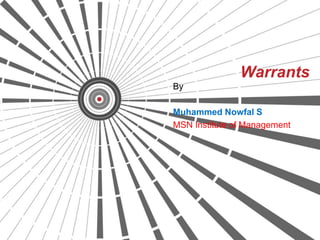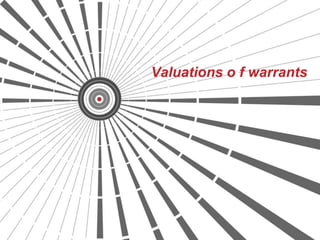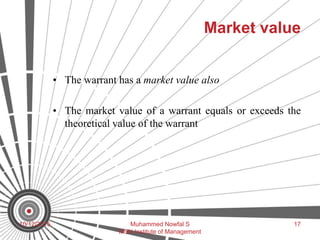Warrant ppt
- 1. Warrants By Muhammed Nowfal S MSN Institute of Management
- 2. • A warrant is an option to purchase a specified number of shares at a specified price during or at the expiry of a specified period • a warrant gives the holder the right to purchase from the company a fixed number of shares in future at a pre-determined price. • The holder of the warrant may be allowed to transfer or sell his right in the secondary market or to keep the right as an investment. • The holder of a warrant can choose whether or not to exercise the option 10/12/2015 2Muhammed Nowfal S MSN Institute of Management
- 3. • warrants are not a major source of funds, their characteristics may help the company to attain the desired capital structure. • Warrants are generally issued with other securities (a bond or a preference share) • Warrants may be attached to a debt issue to work as a sweetener and to add to the marketability of the issue 10/12/2015 3Muhammed Nowfal S MSN Institute of Management
- 4. • The warrant contains provisions for : 1. the number of shares that can be purchased per warrant 2. the price at which the warrant can be exercised. 3. the warrant expiration date. • Warrant holders are not entitled to any dividends nor do they have any voting power. 10/12/2015 4Muhammed Nowfal S MSN Institute of Management
- 6. • Convertible Security – A bond or a preferred stock that is convertible into a specified number of shares of common stock at the option of the holder. • A convertible security requires surrender of the security in exchange for the equity shares 10/12/2015 6Muhammed Nowfal S MSN Institute of Management
- 7. • This provides the convertible holder a fixed return (interest or dividend) and the option to exchange a bond or preferred stock for common stock. • The option allows the company to sell convertible securities at a lower yield than it would have to pay on a straight bond or preferred stock issue. 10/12/2015 7Muhammed Nowfal S MSN Institute of Management
- 8. • Warrant – A relatively long-term option to purchase common stock at a specified exercise price over a specified period of time. • A warrant, on the other hand, requires a surrender of the warrant plus the payment of additional cash, called the option price or the exercise price, in order to obtain the equity shares. 10/12/2015 8Muhammed Nowfal S MSN Institute of Management
- 9. • Warrants are issued by a company to investors who may exercise them to buy the shares or may re-sell them to other investors. 10/12/2015 9Muhammed Nowfal S MSN Institute of Management
- 10. • A convertible security issue gives the holder the right to receive equity shares through the exchange of the convertible for the equity shares; the warrant entitles the security holder to purchase equity share at a specified price. • Both securities provide the purchaser with the opportunity for a speculative gain if the company is successful and the market price of the equity share increases. 10/12/2015 10Muhammed Nowfal S MSN Institute of Management
- 11. • If the warrant is converted then the capital structure is shifted to a relatively lower leverage position because new equity capital is issued without any change in debts. If convertible securities are converted then the reduction in leverage would be more pronounced because new equity share would be issued with a reduction in debt. 10/12/2015 11Muhammed Nowfal S MSN Institute of Management
- 12. Warrants and share right
- 13. • The purpose of the warrant may be to make a debt issue or a preference capital issue attractive, whereas the right has an objective of raising fresh funds as well to maintain the prorata share holding of the existing shareholders. • The share right is generally exercised in a short period of one month or so, whereas warrants are generally convertible after a year or so • The right shares are generally issued at a price lower than the prevailing market, whereas the conversion price of the warrants may be kept slightly higher than the current prevailing market price 10/12/2015 13Muhammed Nowfal S MSN Institute of Management
- 14. Features of Warrants • Warrants are issued by attaching them to other securities. • Warrants can be traded as a separate instrument. • The number of equity shares that can be purchased is fixed • The exercise price is also fixed. • Warrants carry no voting rights and are not entitled to receive dividend or interest payment 10/12/2015 14Muhammed Nowfal S MSN Institute of Management
- 15. Valuations o f warrants
- 16. Theoretical value • The theoretical value of a warrant equals the difference between the market price of the equity shares purchased through warrants and the total option price paid for these shares to the company. • TVw = (MP - OP) x N In case, a warrant entitles to purchase only one equity share, then the • TVw = (MP - OP) 10/12/2015 16Muhammed Nowfal S MSN Institute of Management
- 17. Market value • The warrant has a market value also • The market value of a warrant equals or exceeds the theoretical value of the warrant 10/12/2015 17Muhammed Nowfal S MSN Institute of Management
- 18. 10/12/2015 18Muhammed Nowfal S MSN Institute of Management
- 19. • The market value of a warrant depends upon many factors such as: (i) Share price: A higher share price will increase the value of a warrant. (ii) Offer price: A higher offer price will mean a lower value for the warrant as the warrant holder must pay more for the shares purchased. (iii) Underlying risk: The total risk of the volatility of the share price also affects the market value of the warrant. (iv) Time to expiry: The longer the time to expiry, the higher would be the value of the warrant. 10/12/2015 19Muhammed Nowfal S MSN Institute of Management
- 20. 10/12/2015 20Muhammed Nowfal S MSN Institute of Management



















